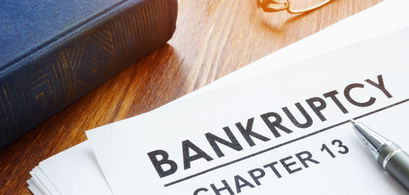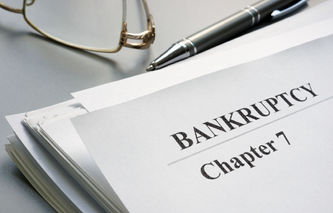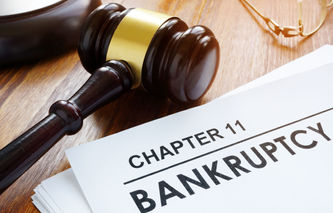Also known as individual debt adjustment, a Chapter 13 bankruptcy proceeding allows individuals with a source of regular income to build a plan to repay some, or all, of their debts. Within this process, repayment to creditors occurs over the course of three to five years. In this article, we're going to run through the basics of Chapter 13 bankruptcy. As part of that explanation, we're going to review some of the rules of the process, eligibility requirements, in addition to the advantages and disadvantages of filing under Chapter 13. Finally, we'll talk about completing the repayment plan, and discharge of debts.
Chapter 13 Bankruptcy Process
The Chapter 13 process allows the debtor to repay all, or a portion, of the money owed to creditors. Generally, if the debtor's monthly income is less than their state's median income, the plan will remain in place three years. If the debtor's monthly income is greater than the state median, the plan could last up to five years.
Eligibility Rules
The eligibility rules under Chapter 13 are fairly straightforward:
If the individual's unsecured debt is less than $336,900, and secured debt is less than $1,010,650, then filing under Chapter 13 is permitted.
If the debtor failed to appear in court, comply with court orders, or had a prior bankruptcy filing dismissed during the preceding 180 days, the debtor cannot file for bankruptcy.
Finally, any individual attempting to file under Chapter 13 protection must have received credit counseling from an approved agency during the preceding 180 days.
Filing Requirements
Individuals file for bankruptcy in a court designated as servicing their residence. Debtors will be asked to provide schedules of their assets, liabilities, household income, as well as a detailed outline of all living expenses. They'll also be asked to provide a list of all known creditors, and the amounts owed each lender. The debtor will be required to file a repayment plan no more than 15 days after submitting their case filing. The plan will ultimately be submitted to a court for approval, and the plan will contain detailed information such as an outline of the schedule of periodic payments to the trustee. Chapter 13 is the second most popular choice of filers, with around 30% of all cases falling into this category. The table below shows the number of Chapter 13 filings from 2007 through 2019:
Year | Total Filings |
2007 | 324,771 |
2008 | 362,762 |
2009 | 406,962 |
2010 | 438,913 |
2011 | 406,084 |
2012 | 366,532 |
2013 | 333,626 |
2014 | 310,061 |
2015 | 301,705 |
2016 | 296,665 |
2017 | 294,637 |
2018 | 290,146 |
2019 | 276,443 |
Source: U.S. Bankruptcy Courts
Chapter 13 Trustees
The Chapter 13 process requires the appointment of a trustee to oversee each case. The trustee will collect payments from the debtor, and assume the responsibility of distributing the money collected from the debtor back to all known creditors.
The chapter 13 bankruptcy process allows the debtor to repay all, or a portion of the money owed to creditors. Typical plans last up to five years.Moneyzine Editor
The trustee will arrange for a meeting with creditors and the debtor must attend. This meeting usually takes place 20 to 50 days after the bankruptcy filing. During this meeting, the debtor will answer questions under oath from both the creditor and trustee. The proposed repayment plan will also be reviewed with creditors. Even if the repayment plan has not yet been approved by the court, the debtor is required to start making periodic payments to the trustee within 30 days after filing their case.
Confirmation Hearing
A bankruptcy judge will hold a confirmation hearing to determine the plan's feasibility, and whether or not the plan meets all the requirements of the law no more than 45 days after meeting with creditors. There are four possible outcomes from the confirmation hearing:
Confirmation of Plan: the judge will approve the plan, and the trustee will then begin to distribute money to creditors.
Plan Modified: if the judge does not confirm the plan, the debtor has the opportunity to submit a modified repayment plan.
Liquidation: the case can be converted to a liquidation case under Chapter 7.
Case Dismissed: finally, the judge can dismiss the case, and ask the trustee to return all money to the debtor that has not already been distributed to creditors.
Pros and Cons
One of the disadvantages of filing for bankruptcy is that a record of the filing stays on that individual's credit report for up to 10 years. Debtors are also restricted from seeking new credit without first gaining the judge's permission. The advantage of filing under Chapter 13 is that homeowners can stop the foreclosure process. Generally, if the creditor has a secure claim (the debt involves collateral such as a home or car), the plan must provide for full repayment of the debt. However, unsecured claims, such as credit card debt, need not be paid in full as long as all disposable income is paid to the trustee for the duration of the plan.
Discharge of Debt
If the debtor successfully makes all periodic payments outlined in their plan, and has attended a course in financial management, then their remaining debt may be discharged. A discharge releases the debtor from all future obligations to repay any remaining debt covered in the plan. This means creditors can no longer seek repayment of any discharged debt. Debts that are not eligible to be discharged as part of a Chapter 13 proceeding include certain secured debt such as a home mortgage or a car loan. Discharged debt also excludes payments arising from legal proceedings such as the cost of child support, alimony, personal injury awards, and crimes. Finally, money owed to government agencies such as income taxes, and student loans, are not discharged upon the successful completion of a Chapter 13 plan.



